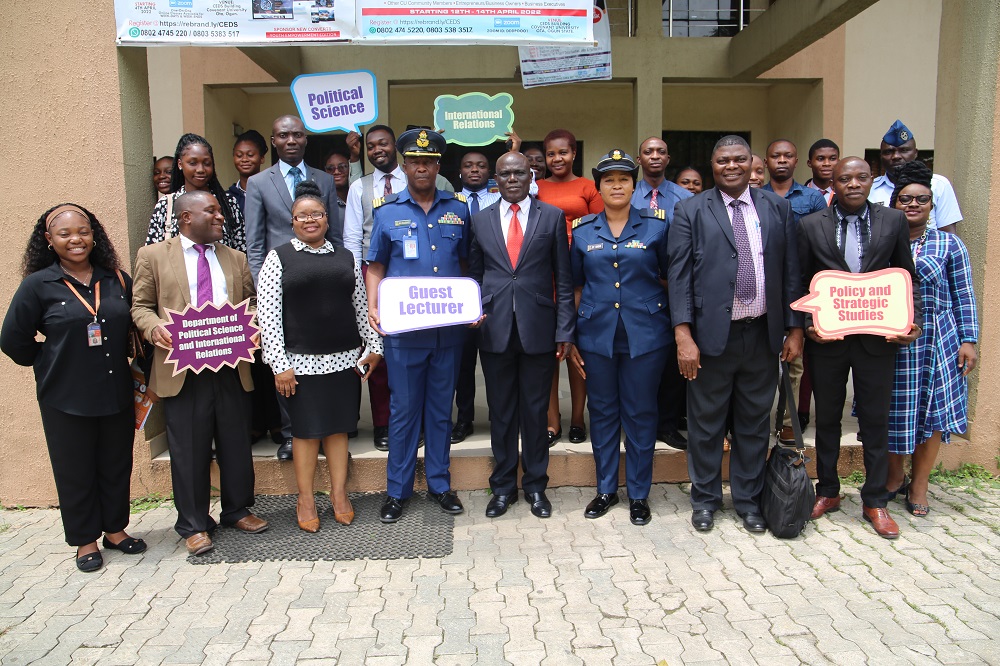A senior military personnel has stated that choosing a career is one of the most important decisions you will make in life. This is because a career is a person's course of progress through life or a distinct portion of life.
The above submission was made by Wing Commander Michael Adekunle Oragbade of the Nigerian Air Force Base, Ikeja, at a recent Town and Gown Seminar of the Political Science and International Relations, Covenant University, Ota, where he was a Guest Speaker, on the theme, ‘After Graduation: Career Dream and the Prospect of Becoming a Military Officer.’
Wing Commander Oragbade, who is also an Engineer and an Accountant, explained that the aim of his presentation was to educate undergraduates and postgraduate students in the Political Science and International Relations Department of Covenant University on the prospects of becoming military officers after graduation.
According to Oragbade, the average time an individual spends on the job yearly is approximately 71% of our lifetime; this comes to roughly 31 and a half years out of the 45 years most of us spend working, from the beginning of our careers until retirement. So, being in the wrong job or career path, he said, is to be in a constant state of depression.
He stated that there are only three options to find a way out of frustration when a person is caught in the trap of the wrong career path, which includes outright career switching, combining careers, or living with career dissatisfaction.
Elucidating on the military as a viable career option, he stated that the military is the career of the group or groups of people that are given power to defend something (mostly a country) and that the military of a country is usually divided into different branches, which include the Army, tasked with the defence of a country by land; the Navy, tasked with the defence of a country by sea; and the Air Force, tasked with the defence of a country by air.
Aside from being a commissioned officer, he stated that there are many other supporting jobs to do in the Air Force to achieve its primary responsibilities, and some of them include flying of passenger airplanes; repair of aircraft, weapons, and engines; and medical care for sick and wounded personnel and their families.
He said others are: construction and repair of roads and buildings; manufacturing of drugs; administrative duties; teaching and lecturing; intelligence gathering; public relations; and religious leadership, amongst others.
He encouraged students who would like to register with the Nigerian Air Force to either enlist through the Commissioned Officer Cadre or the Non-commissioned Officer Cadre. He, however, explained that the commissioned officer cadre has two channels of entry, which are primarily by enlisting in the Nigerian Defence Academy (NDA) after secondary school education or by Direct Short Service (DSS), after attaining a first degree from an accredited institution.
In conclusion, Wing Commander Aragbade pointed out that joining the Air Force is an act of patriotism and a sense of duty, as it involves defending one's nation. It provides opportunities for skills acquisition and training; leadership development; and after-service benefits, amongst others.
"And more interestingly, every officer with the right potential can progress through the ranks within 35 service years or 60 years of age, from the lowest rank of Flying Officer or Pilot Officer to the enviable rank of Marshal of the Air Force." He added
While making his opening remarks, the Head of Department, Political Science and International Relations, Professor Daniel Gberevbie, appreciated the University Management for the veritable platform of interaction between academia and industry, stating that it has been of immense benefit to the students and even the faculty and staff of the university have benefited as well.
He heartily thanked the guest speaker and members of his entourage and expressed his gratitude for the honour they showed, responding promptly to the invitation to speak and share his military experience and expertise with the students. He encouraged all participants to endeavour to pay attention as the lecture was going to be special in both delivery and content.
Professor Gberevie advised the students to be extra cautious because the lecture could be a defining and deciding factor for some of them who want to serve in the military after graduation. He encouraged them to ask questions in the course of the lecture and get clarity in any areas of doubt to help them make good decisions about the future in their respective career interests.
Others at the event were other senior members of the faculty and staff of the Department.

